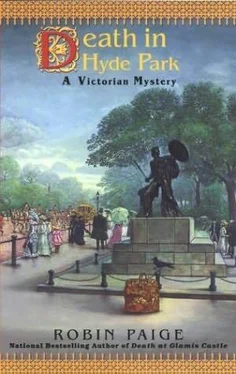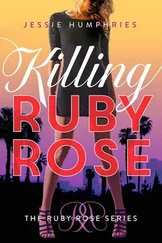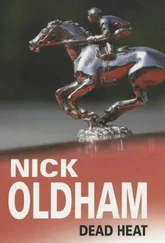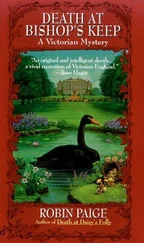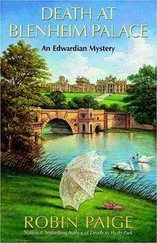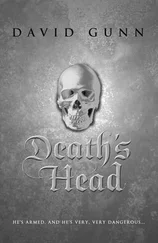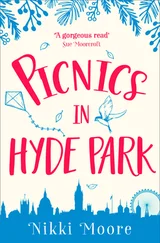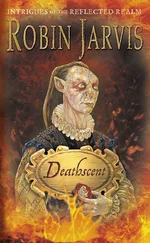Robin Paige - Death in Hyde Park
Здесь есть возможность читать онлайн «Robin Paige - Death in Hyde Park» весь текст электронной книги совершенно бесплатно (целиком полную версию без сокращений). В некоторых случаях можно слушать аудио, скачать через торрент в формате fb2 и присутствует краткое содержание. Жанр: Классический детектив, на английском языке. Описание произведения, (предисловие) а так же отзывы посетителей доступны на портале библиотеки ЛибКат.
- Название:Death in Hyde Park
- Автор:
- Жанр:
- Год:неизвестен
- ISBN:нет данных
- Рейтинг книги:5 / 5. Голосов: 1
-
Избранное:Добавить в избранное
- Отзывы:
-
Ваша оценка:
- 100
- 1
- 2
- 3
- 4
- 5
Death in Hyde Park: краткое содержание, описание и аннотация
Предлагаем к чтению аннотацию, описание, краткое содержание или предисловие (зависит от того, что написал сам автор книги «Death in Hyde Park»). Если вы не нашли необходимую информацию о книге — напишите в комментариях, мы постараемся отыскать её.
Death in Hyde Park — читать онлайн бесплатно полную книгу (весь текст) целиком
Ниже представлен текст книги, разбитый по страницам. Система сохранения места последней прочитанной страницы, позволяет с удобством читать онлайн бесплатно книгу «Death in Hyde Park», без необходимости каждый раз заново искать на чём Вы остановились. Поставьте закладку, и сможете в любой момент перейти на страницу, на которой закончили чтение.
Интервал:
Закладка:
For another moment she clung to the roof, breathless and giddy, the sour taste of fear in her mouth. But since she couldn’t go back, she had to go on. One foot, another foot, another-and in a few minutes she had reached the corner of the building. She looked to her left and saw, with a vast relief, that she had remembered correctly. This building and its four-story neighbor were only a few feet apart, and she was almost within arm’s reach of the iron fire-ladder that was bolted to the other building’s brick wall. Almost. All she had to do was lean out across that horrid, empty space, reach for the ladder, and…
Charlotte squeezed her eyes shut, her breath coming hard, the blood pulsing in her throat. The ladder was a full yard away, at least a foot out of reach. Only a foot, she thought, paralyzed with fright, but it might as well be a mile. She couldn’t reach the ladder unless she let go of the roof. And no matter how hard she willed herself to relinguish her grip, her fingers clung to From the street below, she heard the shrill of a police whistle and more loud shouting, and saw two uniformed policemen wrestling Adam out of the building and into a police van. Now! she thought. It’s now, or not at all! Closing her mind to her fear, she turned toward the ladder and launched herself across the void, her right hand grasping the rusty iron, her right foot reaching, slipping, leaving her swinging like a circus wire-artist above the emptiness.
And then her right foot found a rung, and then her left, and she was clinging to the ladder, then stepping smartly down, praying that her foot would not catch in the hem of her blasted skirt. A few moments later, she was safely on the sidewalk, to the delight of a strongly-built, dark-haired young man in a coal stoker’s singlet, worn trousers, and a green cloth cap, who had apparently been watching her descend. As she dropped lightly to the ground from the last rung of the ladder, the man gave her a look that seemed full of recognition, and she saw that he had very blue eyes, deeply fringed with black lashes. Then, his eyes still fastened on hers, he grinned engagingly and tipped his cap. His hair was dark, too, tousled and rakish.
Charlotte felt the immediate attraction between them as if it were an electrical charge. But this was no time for such things. She threw him a dazzling smile, put a warning finger to her lips, and disappeared into the crowd.
CHAPTER THREE
“Getting into print: advice to young writers”
Don’t quit your job in order to write unless there is no one dependent on you. Fiction pays best of all, and when it is of fair quality is more easily sold… Avoid the unhappy ending, the harsh, the brutal, the tragic, the horrible-if you care to see in print the things you write… And keep a notebook. Travel with it, sleep with it. Slap into it every stray thought that flutters up into your brain. Cheap paper is less perishable than grey matter, and lead pencil marking endures longer than memory.
Jack London, The Editor Magazine, 1903Jack London stripped off his coal-smudged stoker’s jacket and splashed water from the basin over his face. Then he put on a clean white shirt and exchanged the clumsy leather brogans for his own soft leather shoes. With a sigh of relief, he pulled out a flask of gin, took a swig, and dropped down on one of the two narrow beds, surveying his surroundings.
The small upstairs room was rudely furnished and uncomfortable, but adequate for his purposes. It had been found for him by members of the Social Democratic Federation in the home of an East End police detective, an irony that was not lost on Jack, who during his vagabond days had developed an intense dislike of all policemen. But he was in something of a dilemma, for his research-he was conducting what he thought of as a sociological study-required him to go about the East End dressed in ragged, dirty clothes, while other business would take him out in his ordinary clothing. A decent landlady would be apt to be suspicious of a gentleman leading a double life, while lodgings in a house where nobody gave a damn might not be entirely safe. And Jack needed a safe house, a refuge where he could sleep comfortably, work on his book, and go and come as he pleased.
So when the S.D.F. had found him a lodging in the home of Detective John Palmer, known to East Enders as Johnny Upright, Jack had jumped at it. The room-which contained two beds, a table, and two chairs-was at the back of the house and had its own private stair. It was, of course, a far cry from his country home in the Piedmont Hills of California, a large redwood bungalow with a panoramic view of San Francisco Bay, the Golden Gate Bridge, and the Pacific Ocean. There, he entertained his artistic friends and lived the lavishly hedonistic life that was entirely suited to a successful writer. If this luxury seemed at odds with his rough, rugged stories of life-and-death adventure in the wilds of the Yukon Territory or his well-known stance as a Socialist who advocated the abolition of the class system-well, so be it. Jack had left school to work in a cannery at fourteen, and had known a decade of poverty since. Now that his writing had begun to bring in money, he deserved (he felt) to revel in his prosperity, although he somehow managed to spend more than he earned and was continually in debt.
But the household in the Piedmont Hills also included Jack’s mother, his pregnant wife Bess, and their infant daughter, a stifling, suffocating responsibility. For a time-wondrous, but far too brief-it had also included the woman he loved, Anna Strunsky, she of the lustrous black hair and black eyes, a radical Socialist from a Russian Jewish family with Anarchist leanings. When Bess discovered Anna and Jack in each other’s arms, however, Anna had packed up and gone to New York, leaving Jack beside himself with lonely desolation.
Feeling trapped in a marriage to a woman he didn’t love, his writing mired in the lucrative but tedious Klondike rut, and (as always) in dire need of money to fund his extravagant life, Jack had jumped at an offer that came in late July from the American Press Association. The Boer War had just ended, and the APA wanted America’s foremost adventure writer to go to South Africa and report on the postwar situation. With enormous relief, he telegraphed his acceptance, packed his bags, and caught a train for New York-only to learn when he got there that the APA had canceled the project.
Having already bought a steamer ticket and not eager to return to Bess and his mother, Jack came up with another idea. An admirer of Jacob Riis’s graphic indictment of the New York slums, How the Other Half Lives, he proposed to capitalize on the best-selling book’s success by writing a similar expose of London’s infamous East End. He would disguise himself as a tramp so he could travel unobserved through the notorious slums. “I shall sink down out of sight,” he had written to Anna during his crossing on the steamer Majestic, “in order to view the Coronation from the standpoint of the London beasts. That’s all they are-beasts-if they are anything like the slum people of New York-beasts, shot through with starry flashes of divinity.” He would call his book The People of the Abyss.
Of course, the East End wasn’t the only allure. For one thing, Jack had never traveled to England or Europe, and there were sights he wanted to see. For another, the British publishing company Isbister had recently brought out a collection of his short stories, The God of His Fathers, and would soon publish The Son of the Wolf. Perry Robinson, Isbister’s director, assured Jack that he had many British admirers and seemed anxious to introduce him to the literary community.
Well, Robinson’s introduction-a first-rate champagne supper in one of the best hotels-was over. Isbister had done well by him, inviting a posse of literary critics and several dozen of Britain’s literary lights to meet him. Jack knew the work of several, and particularly admired that of Beryl Bardwell, whose strong women characters reminded him of what he liked to call the “Mate Woman,” women who were filled to the brim with life and refused to be bound by conventional moral codes. Jack had told Miss Bardwell about his plan to go incognito into the East End, and learned to his surprise that she was familiar with the district and had gone there more than once herself, unaccompanied. ^1 Jack’s pleasure in meeting the striking Miss Bardwell and her husband (a baron) was offset, unfortunately, by his disappointment that Rudyard Kipling had declined Isbister’s invitation. That little slight had caused him to sulk all evening.
Читать дальшеИнтервал:
Закладка:
Похожие книги на «Death in Hyde Park»
Представляем Вашему вниманию похожие книги на «Death in Hyde Park» списком для выбора. Мы отобрали схожую по названию и смыслу литературу в надежде предоставить читателям больше вариантов отыскать новые, интересные, ещё непрочитанные произведения.
Обсуждение, отзывы о книге «Death in Hyde Park» и просто собственные мнения читателей. Оставьте ваши комментарии, напишите, что Вы думаете о произведении, его смысле или главных героях. Укажите что конкретно понравилось, а что нет, и почему Вы так считаете.
